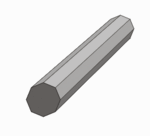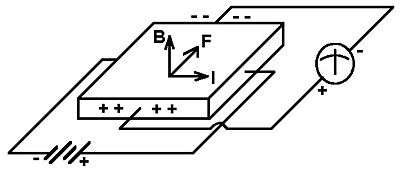Solution to Set 6: Difference between revisions
(→Given) |
|||
| Line 84: | Line 84: | ||
* Area <math>A = L \times W = 2.0 \times 10^{-5} m^2</math> | * Area <math>A = L \times W = 2.0 \times 10^{-5} m^2</math> | ||
[[Image:Semiconductor.png|right|200px]] | |||
====Determine==== | ====Determine==== | ||
| Line 91: | Line 93: | ||
<math>\rho = R \cdot \frac {A}{\ell} \;</math> | <math>\rho = R \cdot \frac {A}{\ell} \;</math> | ||
<math> = \frac{V}{I} \cdot \frac {A}{\ell} \;</math> | <math> = \frac{V}{I} \cdot \frac {A}{\ell} \;</math> | ||
<math> = \frac{2V}{0.04A} \cdot \frac{2 \times 10^{- | <math> = \frac{2V}{0.04A} \cdot \frac{2 \times 10^{-5}m^2}{0.005m} \;</math> | ||
<math> = | <math> = 0.2 \Omega \cdot m \;</math> | ||
<math>\sigma = \frac{1}{\rho} = \frac{1}{ | <math>\sigma = \frac{1}{\rho} = \frac{1}{0.02 \Omega \cdot m} \;</math> | ||
<math> = | <math> = 5 \tfrac{S}{m} \;</math> | ||
# Carrier density | # Carrier density | ||
| Line 104: | Line 106: | ||
<math>n = -\frac{1}{e} \cdot \frac{V_H}{I \cdot \tfrac{B}{\ell}} \;</math> | <math>n = -\frac{1}{e} \cdot \frac{V_H}{I \cdot \tfrac{B}{\ell}} \;</math> | ||
<math> = - \frac{1}{-1.602 \times 10^{-19}C} \cdot \frac{0.015V}{\left (0.04A \right ) \cdot \tfrac{\left (0.1T \right )}{\left (0. | <math> = - \frac{1}{-1.602 \times 10^{-19}C} \cdot \frac{0.015V}{\left (0.04A \right ) \cdot \tfrac{\left (0.1T \right )}{\left (0.005m \right )}} \;</math> | ||
<math> = 1. | <math> = 1.1704 \times 10^{17} m^{-3} \;</math> | ||
# Mobility | # Mobility | ||
Revision as of 02:08, 9 April 2009
Problem 1.
Given
Aluminum(Al) is trivalent with
- atomic mass Failed to parse (SVG (MathML can be enabled via browser plugin): Invalid response ("Math extension cannot connect to Restbase.") from server "https://wikimedia.org/api/rest_v1/":): {\displaystyle m_{a} = 27} amu
- density Failed to parse (SVG (MathML can be enabled via browser plugin): Invalid response ("Math extension cannot connect to Restbase.") from server "https://wikimedia.org/api/rest_v1/":): {\displaystyle n = 2.7 g/cm^3}
- room temperature Failed to parse (SVG (MathML can be enabled via browser plugin): Invalid response ("Math extension cannot connect to Restbase.") from server "https://wikimedia.org/api/rest_v1/":): {\displaystyle T = 293 - 296.5 K}
- mean free time between electron collisions Failed to parse (SVG (MathML can be enabled via browser plugin): Invalid response ("Math extension cannot connect to Restbase.") from server "https://wikimedia.org/api/rest_v1/":): {\displaystyle t_{avg} = 4{\rm x}10^{-14}} s.
(a) Resistivity
Calculate the resistivity Failed to parse (SVG (MathML can be enabled via browser plugin): Invalid response ("Math extension cannot connect to Restbase.") from server "https://wikimedia.org/api/rest_v1/":): {\displaystyle \rho} of aluminum(Al) at room temperature.
Failed to parse (SVG (MathML can be enabled via browser plugin): Invalid response ("Math extension cannot connect to Restbase.") from server "https://wikimedia.org/api/rest_v1/":): {\displaystyle \rho = \frac{1}{\sigma} \;} Failed to parse (SVG (MathML can be enabled via browser plugin): Invalid response ("Math extension cannot connect to Restbase.") from server "https://wikimedia.org/api/rest_v1/":): {\displaystyle = \frac{1}{ 37.8 \times 10^{6} S m^{-1}} \;} Failed to parse (SVG (MathML can be enabled via browser plugin): Invalid response ("Math extension cannot connect to Restbase.") from server "https://wikimedia.org/api/rest_v1/":): {\displaystyle = 2.82 \times 10^{-8} \;} Ω·m
(b) Current
If a 2-V voltage is applied to the ends of an aluminum wire 10 m long and with a cross- sectional area of Failed to parse (SVG (MathML can be enabled via browser plugin): Invalid response ("Math extension cannot connect to Restbase.") from server "https://wikimedia.org/api/rest_v1/":): {\displaystyle 1 mm^2}
Failed to parse (SVG (MathML can be enabled via browser plugin): Invalid response ("Math extension cannot connect to Restbase.") from server "https://wikimedia.org/api/rest_v1/":): {\displaystyle R = \frac{\ell \cdot \rho}{A} \;} Failed to parse (SVG (MathML can be enabled via browser plugin): Invalid response ("Math extension cannot connect to Restbase.") from server "https://wikimedia.org/api/rest_v1/":): {\displaystyle = \frac{\left (10m \right ) \cdot \left (2.646 \times 10^{-8} \Omega \cdot m \right )}{\left (10^{-6}m \right )} \;} Failed to parse (SVG (MathML can be enabled via browser plugin): Invalid response ("Math extension cannot connect to Restbase.") from server "https://wikimedia.org/api/rest_v1/":): {\displaystyle = 0.2646 \Omega \;}
What is the current flowing through it?
Failed to parse (SVG (MathML can be enabled via browser plugin): Invalid response ("Math extension cannot connect to Restbase.") from server "https://wikimedia.org/api/rest_v1/":): {\displaystyle I = \frac{V}{R} = \frac{2V}{0.2646 \Omega} = 7.559 A \;}
Problem 2
The resistivity of a certain material at room temperature is 0.02 Wm and the Hall coefficient is Failed to parse (SVG (MathML can be enabled via browser plugin): Invalid response ("Math extension cannot connect to Restbase.") from server "https://wikimedia.org/api/rest_v1/":): {\displaystyle 5{\rm x}10^{-4}} Failed to parse (SVG (MathML can be enabled via browser plugin): Invalid response ("Math extension cannot connect to Restbase.") from server "https://wikimedia.org/api/rest_v1/":): {\displaystyle m^3 /C} . An electric field of 1 V/m is applied across it. Deduce all the information you can think of about this material.
Given
- Temperature Failed to parse (SVG (MathML can be enabled via browser plugin): Invalid response ("Math extension cannot connect to Restbase.") from server "https://wikimedia.org/api/rest_v1/":): {\displaystyle T = 20^{\circ} C \;}
- Resistivity Failed to parse (SVG (MathML can be enabled via browser plugin): Invalid response ("Math extension cannot connect to Restbase.") from server "https://wikimedia.org/api/rest_v1/":): {\displaystyle \rho = 0.02 \Omega \cdot m \;}
- Hall coefficient Failed to parse (SVG (MathML can be enabled via browser plugin): Invalid response ("Math extension cannot connect to Restbase.") from server "https://wikimedia.org/api/rest_v1/":): {\displaystyle R_{H} = 5{\rm x}10^{-4} \tfrac{m^{3}}{C} \;}
- Electric field Failed to parse (SVG (MathML can be enabled via browser plugin): Invalid response ("Math extension cannot connect to Restbase.") from server "https://wikimedia.org/api/rest_v1/":): {\displaystyle E = 1 \tfrac{V}{m} \;}
Deduction
- Conductivity
Failed to parse (SVG (MathML can be enabled via browser plugin): Invalid response ("Math extension cannot connect to Restbase.") from server "https://wikimedia.org/api/rest_v1/":): {\displaystyle \sigma = \frac{1}{\rho} = \frac{1}{0.02 \Omega \cdot m} = 50 \tfrac{S}{m} \;}
- Current Density
Failed to parse (SVG (MathML can be enabled via browser plugin): Invalid response ("Math extension cannot connect to Restbase.") from server "https://wikimedia.org/api/rest_v1/":): {\displaystyle \mathbf{J} = \frac{E}{\rho} = \frac{1 \tfrac{V}{m}}{0.02 \Omega \cdot m} = 50 \tfrac {A}{m^{2}} \;}
- Magnetic Field
Failed to parse (SVG (MathML can be enabled via browser plugin): Invalid response ("Math extension cannot connect to Restbase.") from server "https://wikimedia.org/api/rest_v1/":): {\displaystyle R_{H} = \frac{E}{\mathbf{J} \cdot B} \;}
Failed to parse (SVG (MathML can be enabled via browser plugin): Invalid response ("Math extension cannot connect to Restbase.") from server "https://wikimedia.org/api/rest_v1/":): {\displaystyle B = \frac{E}{\mathbf{J} \cdot R_{H}} \;} Failed to parse (SVG (MathML can be enabled via browser plugin): Invalid response ("Math extension cannot connect to Restbase.") from server "https://wikimedia.org/api/rest_v1/":): {\displaystyle = \frac{\left (1 \tfrac{V}{m} \right )}{\left ( 50 \tfrac{A}{m^{2}} \right ) \left ( 5 \times 10^{-4} m^3 \right )} \;} Failed to parse (SVG (MathML can be enabled via browser plugin): Invalid response ("Math extension cannot connect to Restbase.") from server "https://wikimedia.org/api/rest_v1/":): {\displaystyle = 40 T \;}
Problem 3.
(a) Hall Effect Sketch
Sketch a setup used to measure the Hall effect. Label each part.
(b) Semiconductor Crystal
A semiconductor crystal is 5 mm long, 4 mm wide, and 2 mm thick. A 40mA current flows across the length of the sample after a 2-V battery is connected to the ends. When a 0.1T magnetic field is applied perpendicular to the large surface of the specimen, a Hall voltage of 15mV develops across the width of the sample.
Given
- Length Failed to parse (SVG (MathML can be enabled via browser plugin): Invalid response ("Math extension cannot connect to Restbase.") from server "https://wikimedia.org/api/rest_v1/":): {\displaystyle \ell} = 5 mm
- Width W = 4 mm
- Thickness H = 2 mm
- Current I = 40 mA = 0.04 A
- Voltage V = 2 V
- Mag Field B = 0.1 T
- Hall Volt Failed to parse (SVG (MathML can be enabled via browser plugin): Invalid response ("Math extension cannot connect to Restbase.") from server "https://wikimedia.org/api/rest_v1/":): {\displaystyle V_H} = 15 mV
You can deduce that:
- Area Failed to parse (SVG (MathML can be enabled via browser plugin): Invalid response ("Math extension cannot connect to Restbase.") from server "https://wikimedia.org/api/rest_v1/":): {\displaystyle A = L \times W = 2.0 \times 10^{-5} m^2}
Determine
- Conductivity
Failed to parse (SVG (MathML can be enabled via browser plugin): Invalid response ("Math extension cannot connect to Restbase.") from server "https://wikimedia.org/api/rest_v1/":): {\displaystyle \rho = R \cdot \frac {A}{\ell} \;} Failed to parse (SVG (MathML can be enabled via browser plugin): Invalid response ("Math extension cannot connect to Restbase.") from server "https://wikimedia.org/api/rest_v1/":): {\displaystyle = \frac{V}{I} \cdot \frac {A}{\ell} \;} Failed to parse (SVG (MathML can be enabled via browser plugin): Invalid response ("Math extension cannot connect to Restbase.") from server "https://wikimedia.org/api/rest_v1/":): {\displaystyle = \frac{2V}{0.04A} \cdot \frac{2 \times 10^{-5}m^2}{0.005m} \;} Failed to parse (SVG (MathML can be enabled via browser plugin): Invalid response ("Math extension cannot connect to Restbase.") from server "https://wikimedia.org/api/rest_v1/":): {\displaystyle = 0.2 \Omega \cdot m \;}
Failed to parse (SVG (MathML can be enabled via browser plugin): Invalid response ("Math extension cannot connect to Restbase.") from server "https://wikimedia.org/api/rest_v1/":): {\displaystyle \sigma = \frac{1}{\rho} = \frac{1}{0.02 \Omega \cdot m} \;} Failed to parse (SVG (MathML can be enabled via browser plugin): Invalid response ("Math extension cannot connect to Restbase.") from server "https://wikimedia.org/api/rest_v1/":): {\displaystyle = 5 \tfrac{S}{m} \;}
- Carrier density
Failed to parse (SVG (MathML can be enabled via browser plugin): Invalid response ("Math extension cannot connect to Restbase.") from server "https://wikimedia.org/api/rest_v1/":): {\displaystyle R_H = \frac{E_y}{\mathbf{J_x} \cdot B} \;} Failed to parse (SVG (MathML can be enabled via browser plugin): Invalid response ("Math extension cannot connect to Restbase.") from server "https://wikimedia.org/api/rest_v1/":): {\displaystyle = \frac{V_H}{I \cdot \tfrac{B}{\ell}} \;} Failed to parse (SVG (MathML can be enabled via browser plugin): Invalid response ("Math extension cannot connect to Restbase.") from server "https://wikimedia.org/api/rest_v1/":): {\displaystyle = -\frac{1}{ne} \;}
Failed to parse (SVG (MathML can be enabled via browser plugin): Invalid response ("Math extension cannot connect to Restbase.") from server "https://wikimedia.org/api/rest_v1/":): {\displaystyle n = -\frac{1}{e} \cdot \frac{V_H}{I \cdot \tfrac{B}{\ell}} \;} Failed to parse (SVG (MathML can be enabled via browser plugin): Invalid response ("Math extension cannot connect to Restbase.") from server "https://wikimedia.org/api/rest_v1/":): {\displaystyle = - \frac{1}{-1.602 \times 10^{-19}C} \cdot \frac{0.015V}{\left (0.04A \right ) \cdot \tfrac{\left (0.1T \right )}{\left (0.005m \right )}} \;} Failed to parse (SVG (MathML can be enabled via browser plugin): Invalid response ("Math extension cannot connect to Restbase.") from server "https://wikimedia.org/api/rest_v1/":): {\displaystyle = 1.1704 \times 10^{17} m^{-3} \;}
- Mobility
- Fermi velocity
Problem 4
(a) Fermi Derivations
Derive the expressions for the Fermi energy, Fermi velocity, and electronic density of states for a two-dimensional free electron gas.
(b) Fermi Energy & Velocity of 2D Gas
A 2D electron gas formed in a GaAs/AlGaAs quantum well has a density of Failed to parse (SVG (MathML can be enabled via browser plugin): Invalid response ("Math extension cannot connect to Restbase.") from server "https://wikimedia.org/api/rest_v1/":): {\displaystyle 2{\rm x}10^{11} cm^{-2}} . Assuming that the electrons there have the free electron mass, calculate the Fermi energy and Fermi velocity.


